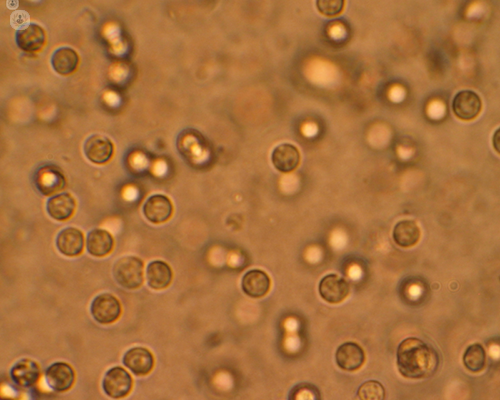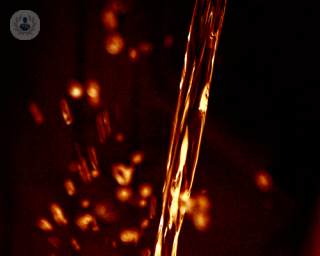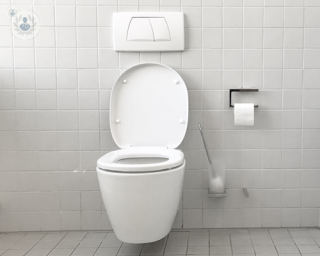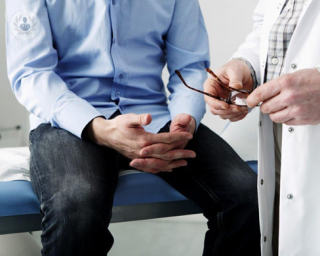Haematuria (blood in the urine)
What is haematuria?
Haematuria is the presence of blood in the urine. Bleeding may arise from any part of the urinary tract. The urinary tract includes the kidneys (most people have two, where urine is made), ureters (the tubes connecting each kidney to the bladder), the bladder, the prostate gland (in men) and the urethra.

Is haematuria always visible?
There are two types of haematuria:
- Visible haematuria: the urine has turned red, pink, or brown. If you see blood in your urine, you must consult a doctor immediately.
- Non-visible haematuria: the colour of urine is normal, but red blood cells can be detected by a standard urine dip analysis, or seen under a microscope.
What are symptoms of haematuria?
Macroscopic haematuria causes the urine to change colour, as mentioned above, due to the presence of red blood cells. Urine turns red with even a small amount of blood, and the passing of urine may be painful if caused by infection (below) or associated with the passage of blood clots in the urine. Loss of body weight and appetite are non-specific symptoms that may be associated with more serious diseases such as cancer.
What are the causes of haematuria?
- Urinary tract infection (UTI) is most common
- Stones in the kidney or bladder
- Medical kidney diseases (glomerulonephritis)
- Excessive exercise
- Benign prostate enlargement (hyperplasia), often referred to as BPH
- Cancer of the bladder, prostate or kidney
Note: Eating a lot of beetroot and some drug treatments can turn urine red in colour!
Is haematuria serious?
In most cases, haematuria is not serious and a cause may not even be found.
In many cases, the presence of blood in the urine has a non-serious cause such as a UTI which can be diagnosed and treated following a consultation with a doctor. Nevertheless, in about 5-8% of cases, the cause may be a serious disease, such as cancer. Therefore, it is important to rule out more serious conditions by having some tests (investigations).

How is haematuria investigated?
A number of tests may be performed to establish the cause behind blood in the urine.
- Urine tests can provide information about the contents of the urine as well as the health of some cells of the lining of the bladder and kidneys.
- Blood tests can show evidence of kidney or other diseases.
- CT scans can show abnormalities within the kidneys, bladder and ureters as well as kidney stones.
- Cystoscopy is a short diagnostic procedure which allows a camera to be inserted into the bladder through the urethra so the lining of the bladder and urethra can be inspected by a urologist, usually under local anaesthetic.
Can haematuria be prevented?
In many cases, haematuria cannot be prevented. However, the risk of developing one of the underlying diseases that leads to haematuria (listed below) can be reduced by taking certain measures:
Urinary tract infections: try to ingest sufficient liquids, urinate when necessary. For women, urinate after intercourse and wipe away urine from the front to the back.
Kidney stones: ingest sufficient liquids
Bladder cancer: stop smoking and avoid exposure to chemicals and tropical parasitic infections (Schistosomiasis).
Kidney cancer: stop smoking, maintain a healthy body weight, and pursue a healthy diet.
What is the treatment for haematuria?
The right treatment for haematuria varies according to the cause found using the above investigations. It may consist of antibiotics to eradicate a urinary tract infection, medication to attempt to reduce the size of an enlarged prostate, or shockwave treatment to fragment stones in the kidney or bladder. Cancers are usually diagnosed by biopsy and treated by surgery, radiotherapy or chemotherapy.
A follow-up will be generally required to verify that there is no longer blood in the urine and that the issue behind the bleeding has been effectively treated. In some cases, treatment is not necessary and patients can resolve their symptoms with rest and by drinking plenty of fluids.
What type of doctor treats haematuria?
Urologists investigate and treat haematuria, as well as other urinary tract disorders.

















